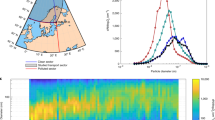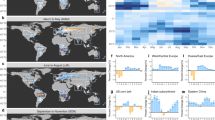Abstract
Declining growth rates and injury to foliage have been observed in forests at high elevations in areas of Europe and North America1,2; in such areas the trees are regularly enveloped in cloud and mist. Concentrations of dissolved chemicals in cloud drops are often much larger than in rain, so the capture of cloud droplets by leaves may give rise to significant rates of ‘occult deposition’3 of acidic pollutants and heavy metals on forests3,4. I point out here that evaporation of intercepted cloudwater from forest canopies, proceeding simultaneously with occult deposition, can lead to chemical concentrations on leaf surfaces that are substantially larger than those measured in cloud drops themselves. These large chemical concentrations may be a cause of the observed injury in forests where wind-driven cloud is common.
This is a preview of subscription content, access via your institution
Access options
Subscribe to this journal
Receive 51 print issues and online access
$199.00 per year
only $3.90 per issue
Buy this article
- Purchase on Springer Link
- Instant access to full article PDF
Prices may be subject to local taxes which are calculated during checkout
Similar content being viewed by others
References
Rehfuess, K. Forstwissenschaftlichen Centralblatt 102, 167–181 (1983).
The Acid Deposition Phenomenon and its Effects vol. 2, 3-37-3-41 (EPA-600/8-83-0168, US Environmental Protection Agency, Washington DC, 1983).
Dollard, G. J., Unsworth, M. H. & Harvey, M. J. Nature 302, 241–243 (1983).
Lovett, G. M., Reiners, W. A. & Olson, R. K. Science 218, 1303–1304 (1984).
Lovett, G. M. Atmos. Envir. 18, 361–371 (1984).
Huzioka, T., Tabata, T. & Matsumura, N. in Studies on Fogs (ed. Hori, T.) 205–220 (Tanne Trading Co., Sapporo, 1953).
Dollard, G. J. & Unsworth, M. H. Atmos. Envir. 17, 775–780 (1983).
Oliver, H. R. Q. J R. met. Soc. 97, 548–553 (1971).
Stewart, J. B. Wat. Resour. Res. 13, 915–921 (1977).
Monteith, J. L. Principles of Environmental Physics, 241 (Edward Arnold, London, 1973).
Fowler, D. & Cape, J. N. Atmos. Envir. (in the press).
Jacobson, J. S. in Ecological impact of acid precipitation (eds Drabløs, D. & Tollan, A.) 41–46 (SNSF, As-NLH, Norway, 1980).
Barrett, C. F. et al. Acid deposition in the United Kingdom (Warren Spring Laboratory, Stevenage, 1983).
Cape, J. N. Envir. Pollut. A34, 259–274 (1984).
Tukey, H. B. Jr A. Rev. Pl. Physiol. 21, 305–324 (1970).
Hori, T. (ed.) Studies on Fogs (Tanne Trading Co., Sapporo, 1953).
Author information
Authors and Affiliations
Rights and permissions
About this article
Cite this article
Unsworth, M. Evaporation from forests in cloud enhances the effects of acid deposition. Nature 312, 262–264 (1984). https://doi.org/10.1038/312262a0
Received:
Accepted:
Issue Date:
DOI: https://doi.org/10.1038/312262a0
This article is cited by
-
Fog- and Rainwater Chemistry in the Tropical Seasonal Rain Forest of Xishuangbanna, Southwest China
Water, Air, and Soil Pollution (2005)
-
Hygroscopic salts on the leaf surface as a possible cause of forest decline symptoms
Water, Air, & Soil Pollution (1995)
-
The effects of wet deposition chemistry on reproductive processes in two pine species: Apparent pollination effectiveness in relation to species pollen sensitivity
Water, Air, & Soil Pollution (1992)
Comments
By submitting a comment you agree to abide by our Terms and Community Guidelines. If you find something abusive or that does not comply with our terms or guidelines please flag it as inappropriate.



